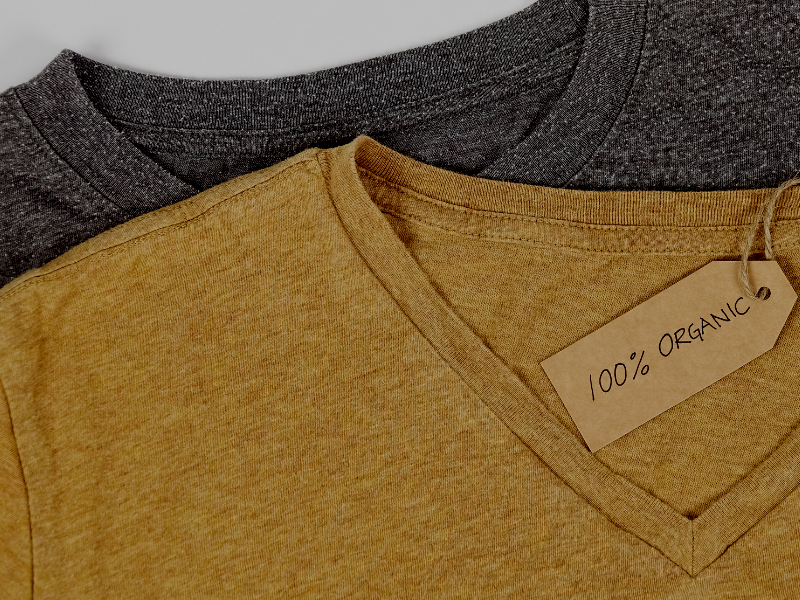7 Lesser Known Reasons Hemp Fiber is a Miracle for Apparel
For the uninitiated, hemp has a purpose beyond the association with its psychoactive cousin. From bed sheets to clothing, and every textile in between, hemp is something of a wonder fiber.
Hemp fiber provides numerous benefits in the form of textiles - from performance-enhancing attributes to low environmental impact, it's one of nature’s miracle fibers.
As hemp garments grow in popularity and demand among consumers, there are still some benefits that go unnoticed but have the opportunity to do more for the brands that market them correctly.
The following are 7 features of hemp with high marketing potential for apparel brands:
Hemp fiber is incredibly strong
Hemp material gets softer with each use
Hemp clothing is better than cotton clothing
Hemp clothing is anti-microbial
Hemp gives back to the environment
Hemp is breathable and lightweight
Hemp is a very eco-friendly material
Let's have a closer look at each, so you can see just how beneficial hemp garments can be for your brand, and hopefully begin brainstorming some ways that you could go to market with a line of hemp garments.
7 Lesser Known Reasons Hemp is Incredible for Apparel Brands
1. Hemp Fiber is Incredibly Strong
One of the most beneficial aspects of hemp fiber is its strength.
Fact: Hemp is Stronger Than Steel
Believe it or not, hemp is stronger than steel!
Materials made out of hemp can be compressed, stretched, and twisted without breaking or becoming deformed. This is a huge benefit when hemp has industrial usage, including making textiles for clothing or other goods.
This makes it one of the most durable fibers available.
Marketing Message: Durability
Clothing made out of hemp is durable and long-lasting thanks to the strength of the hemp plant. When manufacturers weave hemp fiber together they create a material that is highly resistant to wear and tear.
Hemp clothing holds up to abrasion and rough use making it long-lasting and great for activewear.
This is a great selling point for apparel brands that are looking to market their garments as high-quality and long-lasting.
2. Hemp Gets Softer With Each Use
Comfort is one of the most important attributes that people look for in clothing - whether that's clothing for work or apparel for workouts. It's always top of mind for consumers as they enter a purchase cycle for clothing.
Fact: Every Time You Wash Hemp Softens It
Most people imagine hemp as a coarse fabric, and it certainly can be that, especially if it's not blended with another fiber. But every time you wear hemp, requiring it to get washed, it gets softer from that experience.
When it’s first made, hemp has a feeling that is slightly tougher than cotton, similar to soft canvas - where you can feel the texture in full.
Marketing Message: Softer Over Time
Over time, hemp's properties that soften it after being washed are truly unique to this fiber.
The real sticking power of this softness message is that hemp is also strong. So while it may feel softer to the touch, that doesn't mean it's deteriorating in construction.
It won't look well-worn, or begin grinning or gaining holes in the fabric like most apparel would - thanks in large part to its durability and strength covered in the prior point.
But, it will feel more luxurious over time, and now you know that only wine and hemp garments get better with time.
3. Hemp Clothing is Better than Cotton Clothing
That's a bold statement given that cotton is one of the most popular eco-materials in the world. But if you can imagine your cotton t-shirt artifact from college; the one that's barely holding on from back in the day, you'll see why hemp is superior.
Facts That Prove Hemp Outperforms Cotton
Hemp is up to eight times stronger than cotton
Hemp can last up to twice as long as cotton
Hemp requires less than half the water that is required to grow cotton
2.5X as much hemp can be grown on the same area as land as compared to cotton
If that shirt from college was from hemp or a blend of hemp, there's far less chance it would be held together by its last thread.
Fashionable and functional clothing can be made 100% out of hemp. However, you can also find brands and manufacturers that weave other fibers with hemp together.
Even by combining cotton and hemp, one can enjoy the comfort of cotton (its greatest advantage) with the strength and environmental benefits of hemp.
Marketing Message: Better Than Cotton
"Better than cotton" is a bold claim - but there are indisputable facts behind that claim, even if lost in hyperbole. Simply put, the positioning of this claim is that hemp is a reasonable alternative to cotton.
In a similar way that the pork industry positioned itself as "the other white meat" in the 90s, this is the textile equivalent, but with actual benefits that a consumer would appreciate.
4. Hemp Clothing is Antibacterial and Antifungal
In a product world littered with "anti this'" and "anti that's", antimicrobials can be found in several naturally derived fabrics. Antimicrobial is a broader category than antibacterial, but inclusive of antibacterial properties, as well as antifungal.
In the context of hemp textiles, this is the prevention of the growth of bacteria and fungi.
Fact: Hemp Prevents Odorous And Harmful Bacteria and Fungi From Growing
There's certainly a health benefit with tags like "antibacterial" bolted onto hemp. But the most common usage of this title in apparel will come in the form of scent.
Yes, that awful odor that expresses itself from your armpits - hemp's natural properties make it more difficult to latch onto the fabric.
More remarkable though, especially in the context of medical garments, are the properties found in hemp fiber; research has shown hemp to be resistant to bacteria such as MRSA and E. coli as well as other fungi.
But the health benefits of hemp clothing don’t stop there. Hemp also helps protect the wearer from the radiation of the sun.
Hemp clothing is naturally UV resistant protecting you from the sun’s rays.
Hemp clothing is tightly woven and is good at blocking ultraviolet light that can contribute to problems like skin cancer. Hemp is one of the most protective natural fibers you can wear.
Marketing: Hemp Clothes Smell Better
On the lighter side of what you could message with this point, "hemp clothes smell better" is low-hanging fruit. It speaks to a pain point that many people experience with their clothing.
Besides, there are few other fabrics where you could make such a claim and have people believe you.
5. Hemp Gives Back to the Environment
Sustainability is a broad term, that comes with varied definitions - and one that shifts depending on the source.
For consumers, sustainable clothing has traditionally been closely associated with the raw material that makes fiber. But things have changed rapidly since the onset of COVID-19.
Within the supply chain, one oft-overlooked element is soil depletion.
And soil depletion is one of the most harmful outcomes of unsustainable sourcing within the clothing industry. The reason soil depletion is important is that depleted soil requires overcompensation to produce but ultimately can lead to soil that can't be cultivated.
All of this results in catastrophic conditions - new desertification, waterway pollution - eroded waterways that lead to flooding.
This is why crops need to be rotated, but through unsustainable practices to try and produce higher yield and volume in crops, farmers end up depleting the nutrients from their soil.
Fact: Hemp Improves Soil
Hemp is known as a “sister-plant” because it replenishes the soil with nutrients that other plants need to grow. Planting hemp can revive nutrients in the soil, helping any other crop.
Marketing Message: Hemp Revives and Heals Soil
Moreover, hemp crops can even be used to pull detrimental elements out of the soil such as Zinc or Mercury. And planting hemp combats soil erosion by offering a strong root structure.
In all of these ways, hemp is used as a valuable rotation crop, planted in between other plantings as a way to repair the soil for future growth.
6. Hemp Is Breathable and Lightweight
One of the most desirable properties of hemp fabric is the fact that it is so light and airy.
But light and breathable doesn't mean it's limited to summer weather - no, hemp naturally has thermal properties that allow it flex in temperatures.
Fact: Hemp is Thermal Regulating
Thanks to the organic hollow structure of the hemp fibers, hemp naturally helps wearers regulate their body temperature.
Clothing made from hemp allows for the perfect amount of airflow, helping you stay cool when the weather is hot or warm when the weather is cold.
Fabric made from hemp is also very absorbent. This property means the material is great at wicking away moisture and keeping you dry and comfortable even in the sweatiest of situations.
Marketing Message: Hemp Works Year Round
Hemp clothing is appreciated for its ability to move with your body and keep you comfortable in different seasons and settings.
And relevant to something like skiing or snowboarding, where you sweat in cold weather, it's able to draw the moisture from your body but allow airflow in - preventing you from getting cold or oversaturated in the process.
7. Hemp Is Eco-Friendly - Like Really Eco-Friendly
We’ve already covered some of the amazing ways hemp is environmentally friendly…
Hemp uses far less water and land than other materials such as cotton.
Hemp gives back to the earth by contributing vital nutrients and maintaining healthy soil structure.
And, hemp is highly renewable - the growing cycles are much shorter than cotton and plantings can be harvested multiple times per year.
Fact: Hemp Requires No Chemicals
The crowning achievement of hemp is that it can grow without the use of pesticides or fertilizers. Hemp grows so quickly that it often boxes out the sunlight to weeds, preventing their growth altogether.
And as a natural fiber, it's 100% biodegradable.
When hemp thread is produced in natural ways, the resulting fiber is fully compostable.
As long as synthetic dyes or toxic chemicals are not used to create hemp fiber, the material will naturally compost over time.
Marketing Message: Hemp Is Chemical-Free
The production of hemp clothing is much kinder to the environment than other methods - namely because it doesn't require the use of harmful chemicals.
This method is not only good for the environment but also for the people who wear the clothing, as there is no risk of exposure to these harmful chemicals. Which is a very real concern among consumers.
Owning a "safe" message with hemp has high value for consumers.
Hemp Fiber is Truly Remarkable
From performance to comfort and earth-conscious sustainability, hemp offers it all. Even though it's been cultivated for literally thousands of years, only to go dark in the past century, brands and consumers alike are waking up to its benefits as a plant and a textile.
Hemp creates durable and stylish clothing in a way that doesn’t hurt the environment.
At a time when apparel does remarkable harm to the planet, an age-old fiber is providing an equally remarkable solution.

